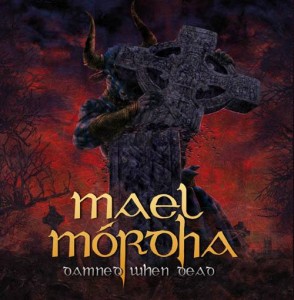 While many of their fellow countrymen have sought to adapt traditional Irish mythologies to a more blackened style of metal, Mael Mórdha have deliberately crafted a sound which is very much rooted in the Celtic folk ethic, which gives their approach to the doomier end of the spectrum a more mournful approach than, say, the more confrontational, or triumphalist one, adopted by, for example, the likes of Primordial (not that this comparison is in any way a negative one in terms of the latter band).
While many of their fellow countrymen have sought to adapt traditional Irish mythologies to a more blackened style of metal, Mael Mórdha have deliberately crafted a sound which is very much rooted in the Celtic folk ethic, which gives their approach to the doomier end of the spectrum a more mournful approach than, say, the more confrontational, or triumphalist one, adopted by, for example, the likes of Primordial (not that this comparison is in any way a negative one in terms of the latter band).
The quartet’s somewhat different approach to merging musical miens old and new is very much reflected in Roibéard Ó Bogail’s distinctive vocals, which are very much rooted in the Sean-nós, or bardic, style of lyrical recitation – which dominates the album from the very beginning and the lamenting declaration of the ‘Laudabiliter’ – the Papal Bull issued by the only English Pope, Adrian IV, in 1155 granting the island of Ireland to King Henry. This is very much the scene setter for the tale that this epic album retells – that of the subsequent subjugation of the ‘barbaric’ Irish and especially their constantly warring chieftains in a bloody, violent invasion which some students of this period in history still argue bordered on the genocidal.
The album recounts the events superbly, building the story with the menace of the approaching English fleet (on ‘King of The English’, capturing the dread of the Gaels as they contemplate the fate about to befall them) and the subsequent brutality of the invasion (as on the punishing ‘Dawning Of The Grey’ and the battlecry of the anthemic ‘All Eire Will Quake’ – the latter of which also serves to emphasize the somewhat Nordic feel of the album’s approach to its subject matter).
As the story progresses, so the music becomes as dark and dense as the tale itself, from the blood-curdling melody on ‘Bloody Alice’ – who singlehandedly beheaded 70 Irish prisoners after her lover made the mistake of going and getting himself killed in battle – to the crushing re-creation of ‘The Sacking Of The Vedrafjord’ (or Waterford in modern English), to the sweeping finale of the eight-minute long title track, based on the mythic belief that the body of the Irish High King, Diarmaid Mac Murdha, who had aided the English invasion of his homeland, was rejected by the very earth his body was buried in, in retaliation for his betrayal of his people…
It’s very rarely that you would use the word ‘beautiful’ to describe a metal album, but that is a more than fitting summation of this haunting, melancholic and essential album.
Eire may have quaked under the Plantagenet jackboot in the late 12th century: nine centuries later the Celts have returned to wreak their own form of conversionary havok on their English oppressors – and the world as a whole.
Tracklist:
Laudabiliter / King Of The English / Dawning Of The Grey / All Eire Will Quake / Bloody Alice (Of Abergavenny) / The Sacking Of The Vedrafjord / A Dirge / Damned When Dead
Mael Mórdha play the following dates in support of the release of ‘Damned When Dead’:
Friday September 27th – Warhorns Festival, The Duchess, York
Saturday September 28th – The Pint, Dublin (with Sodb and Corr Mhona)
Sunday September 29th – Kelly’s, Galway
 PlanetMosh Keeping it Metal
PlanetMosh Keeping it Metal


